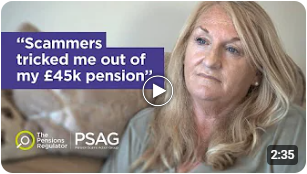More so than ever, pension scammers are looking to exploit savers out of their valuable pension benefits. Pension regulators are encouraging savers not to make any rash decisions during the cost of living crisis.
Pension scams can be hard to spot. Scammers can be convincing and financially knowledgeable, with credible looking websites, testimonials, and materials that are hard to distinguish from the real thing.
Scammers usually contact people out of the blue via phone, email, or text, or even advertise online. Or they may be introduced to you by a friend or family member who is also unknowingly being scammed.
With any transfer we want you to be sure you are transferring to a trusted scheme and to do that we carry out due diligence checks throughout the transfer process.
If we have any concerns at all about the scheme you have requested a transfer to, and there are any flag warnings, we will need to carry out further checks and you may be requested to seek financial advice and attend a guidance session from Moneyhelper.org.uk. You can find more information about this on our What are your options when opting out, leaving or transferring page.
All pension schemes have rules about when and how you can draw your pension benefits to keep your money safe for your retirement.
Normally the earliest you can draw your pension is age 55 unless you retire due to ill health (the Government has announced the earliest age that you can take your pension will increase from age 55 to 57 from 6 April 2028). If you’re facing financial difficulties because of coronavirus, you may be tempted to cash in some of your pension. If a company approaches you offering pensions liberation, saying they will help you to get your pension early using a legal loophole or another method, this could be a scam.
The Pension Regulator has released a video highlighting the risks of pension scams to help raise awareness of the potential warning signs.
Pension pledge
Greater Manchester Pension Fund have self-certified to The Pensions Regulator to confirm that we meet the standards of the pension pledge.
We will:
- regularly warn members about pension scams
- ensure that we know the warning signs of scams and the best practice for transfers
- report concerns about scams to the authorities.
Don’t let a scammer enjoy your savers’ retirement
Scammers are targeting pension pots of all sizes – make sure you know how to spot the signs.
To help you spot the signs and protect yourself from a scam, the Financial Conduct Authority (FCA) and The Pensions Regulator suggest following four simple steps.
Step 1 - Reject unexpected offers
If you’re contacted out of the blue about a pension opportunity, chances are it’s a scam. Pension cold calling is illegal and you should be very wary. An offer of a free pension review from a firm you’ve not dealt with before is probably a scam.
Step 2 - Check who you’re dealing with
Search ScamSmart and check the FCA’s register to make sure anyone offering you advice is authorised. If they are, check they’re permitted to give pension advice by calling the FCA Consumer Helpline on 0800 111 6768.
If you don’t use an FCA-authorised firm, you risk not having access to compensation schemes.
Step 3 - Don’t be rushed or pressured
Take your time to make all the checks you need – even if this means turning down what seems to be an ‘amazing deal’.
Step 4 - Get impartial information or advice
You should seriously consider seeking financial advice before changing your pension arrangements. In some cases, for example where you are wanting to transfer more than £30,000 from a defined benefit scheme, you must obtain this advice.
Consider using MoneyHelper which provides free independent and impartial information and guidance.
Please read the information about potential scams on the following websites:
How to avoid pension scams | FCA
Avoid pension scams | The Pensions Regulator or in their leaflet.
If you suspect a scam, report it.
You can report an unauthorised firm or scam to the FCA using the online reporting form or on 0800 111 6768,
If you suspect a scam, report it to Action Fraud on 0300 123 2040 or at www.actionfraud.police.uk.
Be ScamSmart with your pension. To find out more, visit www.fca.org.uk/scamsmart

